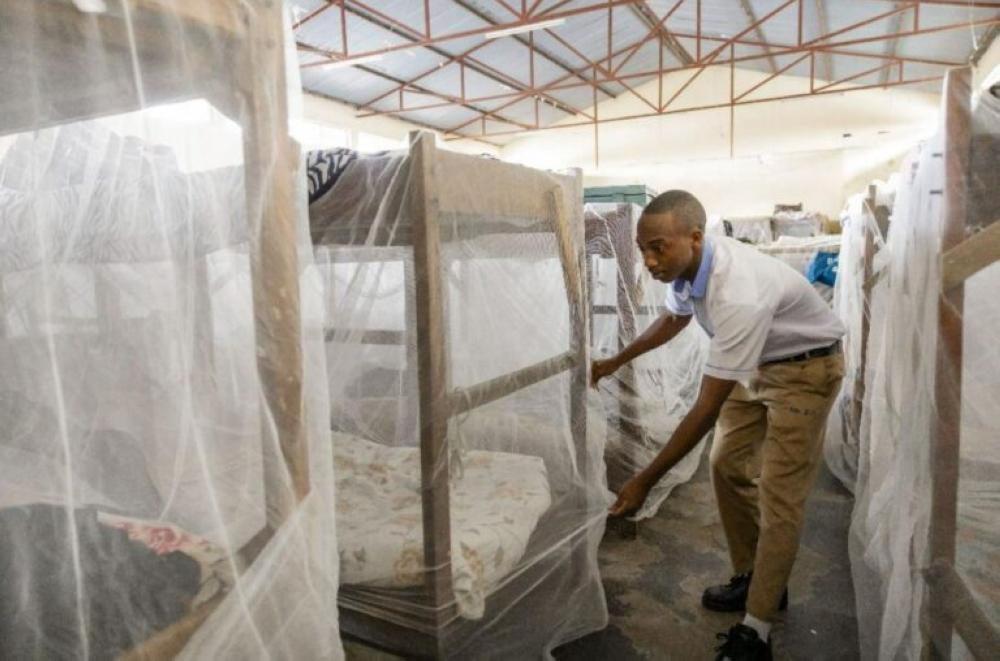Africa-Press – Rwanda. As the country faces a surge in malaria cases this rainy season, boarding schools are stepping up prevention measures to keep students safe.
According to data from Rwanda Biomedical Centre (RBC), 114,804 malaria cases were recorded in September, up from 98,000 in August, including 440 severe cases. By July, the country had registered more than 91,000 cases, with 87 percent concentrated in 15 districts: Gisagara, Gasabo, Bugesera, Kicukiro, Nyagatare, Nyarugenge, Kirehe, Rulindo, Muhanga, Kayonza, Gicumbi, Karongi, Nyaruguru, Nyamasheke, and Nyamagabe.
With students back in boarding schools, administrators say the focus has turned to prevention and early treatment.
At Ecole Secondaire Saint Vincent Muhoza in Musanze District, headteacher Sr. Hilarie Uwimana said the school is maintaining preventive measures.
“We ask parents to bring mosquito nets, and we drain any stagnant water around the school because it is where the mosquitoes breed. We also make sure windows are closed by 5:30 p.m.,” she said.
Uwimana added that the school records one or two malaria cases a month, sometimes none. The biggest challenge, she noted, is the absence of a school clinic.
“When a student falls sick, we take them to Ruhengeri Referral Hospital or Muhoza Health Centre. The common signs we look out for are headaches, fever, and body weakness,” she explained.
Uwimana noted that students with mild symptoms are treated and return to class, but severe cases are referred to hospitals, and parents are notified.
“We call upon the Ministry of Health to support us in setting up a school clinic so that learners can receive first aid before being referred elsewhere,” Uwimana added.
Luke Karemangingo, headmaster of Groupe Scolaire Gahini Secondary School in Kayonza District, said the school follows health guidelines from both the Ministry of Health and the Ministry of Education.
“All boarding schools are required to provide treated mosquito nets. We also conduct indoor residual spraying in dormitories two or three times per term,” he said.
Karemangingo added that the school has a clinic with nurses who handle malaria and other illnesses.
“Every Wednesday afternoon, we hold health education sessions where experts teach students about malaria prevention, hygiene, general health, among other topics,” he said.
Grant Ayebazibwe, principal of Tamayuz International Academy in Musanze District, said managing student health can be challenging because most learners come from different countries and may not have relatives nearby.
“To keep students healthy, we maintain sanitation across the school. This includes cleaning the compound regularly, removing stagnant water, trimming bushes, and applying insecticides to prevent mosquito breeding.
“Students sleep in cubicles of two to four, with beds spaced to allow proper use of treated mosquito nets. Since Musanze is a cold area, learners are encouraged to wear jackets and keep warm,” he said.
Ayebazibwe added that the school nurse conducts regular malaria tests, treats mild cases on-site, and refers severe cases to nearby health facilities.
Dr. Aimable Mbituyumuremyi, Division Manager for Malaria and Neglected Tropical Diseases at RBC, said malaria control requires coordination across multiple institutions.
“Each ministry has a role to play in malaria prevention, for example, the Ministry of Agriculture and Animal Resources manages wetland areas, local governments handle drainage and the removal of stagnant water, and mining operations are being engaged to reduce mosquito breeding in and around their sites,” he said.
He added that RBC, together with the Rwanda NGO Forum on AIDS and Health Promotion (RNGOF), is conducting malaria awareness campaigns in boarding schools.
“We ensure schools with clinics can test and treat malaria, while community health workers support those without. We are also planning to train teachers as community health workers,” Mbituyumuremyi said.
He noted that self-medication is fueling the rise in malaria cases, with some people buying malaria drugs without consulting a doctor. Taking the wrong dose can prevent the medicine from working and allow the parasite to build resistance.
He said heavy rainfall and stagnant water have created more breeding grounds for mosquitoes, with the Eastern Province continuing to record the highest number of malaria cases.
After years of relying on pyrethroid-treated mosquito nets, Mbituyumuremyi added, mosquitoes have developed resistance. Rwanda introduced newer, more effective PBO and G2 insecticide-treated nets, which are designed to kill resistant mosquitoes.
For More News And Analysis About Rwanda Follow Africa-Press






